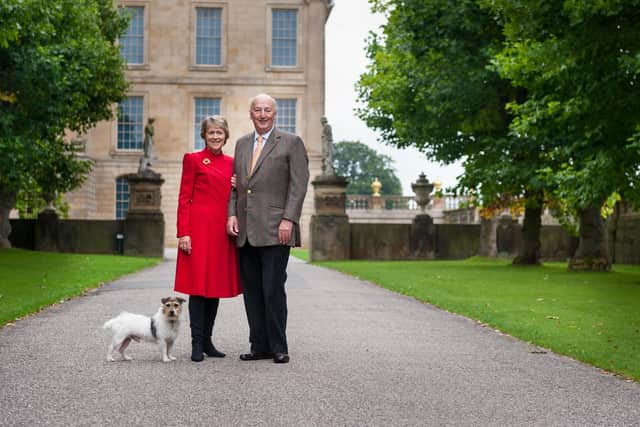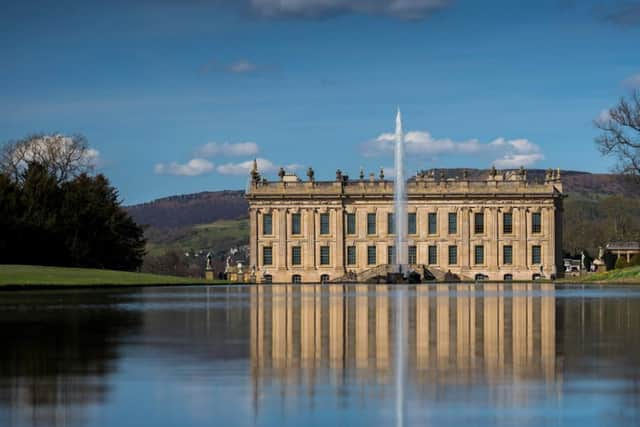Nets have been put on statues at Chatsworth House - this is why
and live on Freeview channel 276
The Chatsworth House Trust was granted planning permission by the Peak District National Park Authority to erect the netting on the estate – which was built in 1555 by William Cavendish and Bess of Hardwick.
Conservationists say that the estate, located near Bakewell and a 20-minute drive from Chesterfield, is placing heritage above the environment, but the trust said that the measures “are not to the detriment of nesting birds”.
Advertisement
Hide AdAdvertisement
Hide AdDerbyshire-based environmentalist Emily Jones told your Times: “Swallows are visitors to Chatsworth House, migrating up to 6,000 miles, from South Africa, often flying across the Sahara Desert to nest in the same place each year.


“They are summer visitors, and have a small time frame to breed in and it is possible that many of these birds won't manage to find an appropriate alternative, causing nest failures and even adult deaths. Instead of supporting the declining population, Chatsworth are, in fact, contributing to their further decline.
“Peregrine Cavendish, the 12th Duke of Devonshire, and his trust, have battled to be allowed to put up netting to stop these summer visitors nesting in their statues.
“Their Grade 1-listed building has been there for 460 years, potentially providing a summer home to 83 generations of swallows, and 16 generations of the Cavendish family themselves.
Advertisement
Hide AdAdvertisement
Hide Ad

“Swifts, swallows and martins have become the losers in a battle of two groups of conservationists here, as the Peak Park Authority has had to choose between the requests of the Chatsworth House trust to net their sculptures, and by wildlife conservation groups who wished to support the birds by preserving their nesting sites.
“The listed status of the building has overridden the protected status of swifts and martins, who are themselves on the UK amber list, with the lack of breeding sites quoted by the RSPB as the cause for their declining numbers.
“Swifts have seen a 57 per cent decrease in breeding numbers, with house martins seeing a 47 per cent decrease in population as a whole. Swallow numbers have been reducing for years, with climate change often given as the main reason.”
She added that the netting controversy is not the first time that the estate had ended up in hot water with wildlife groups – after it was exposed for planning to take part in a badger cull in 2018, and for hosting both the Barlow and High Peak hunts.
Advertisement
Hide AdAdvertisement
Hide AdBut a spokesman for the estate said that the protective measures – to reduce the amount of bird droppings on the statues and the house itself – would not be to the ‘detriment’ of visiting birds.
He said: “The Chatsworth House Trust is dedicated to the long-term preservation of Chatsworth House, the collections, garden, woodlands and park for the long-term benefit of the public.
“In 2019 the trust received planning permission from the Peak District National Park to install a limited number of measures to protect part of the stonework of the house from damage caused by bird droppings.
“The trust worked with an ecologist to ensure that any protective measures would not be to the detriment of nesting birds. During a survey, signs of 11 swallow nesting sites were identified. No evidence was found of swift nesting. This is not surprising, as the stonework is not suited to the type of habitat swifts favour.
Advertisement
Hide AdAdvertisement
Hide Ad“Following the survey, 12 swallow nesting cups were installed on other parts of the house. These were in addition to four that had been installed previously. Although no evidence of swift nests was found on the house, three new double swift boxes were also installed.
“All of these actions were taken to protect both the Grade I listed building, and the habitat of nesting birds.
“The Chatsworth Estate contains a spectacular range of biodiversity and we continue to work with partners to preserve our natural heritage and support wildlife, as we have for generations.”
The estate, which is currently closed due to the coronavirus pandemic is one of the most visited attractions in the UK – with thousands flocking to enjoy its majestic house and gardens each year – and has appeared in many iconic films and television programmes in recent years, including 2005’s Pride and Prejudice and The Duchess in 2008.
Advertisement
Hide AdAdvertisement
Hide AdIt’s interiors were also used to represent Buckingham Palace in The Crown, and scenes from Peaky Blinders were also shot on the estate.
Peregrin Cavendish, the 12th Duke of Devonshire, is said to be worth £800m.
A message from the Editor:
Thank you for reading this story on our website. While I have your attention, I also have an important request to make of you.
In order for us to continue to provide high quality and trusted local news on this free-to-read site, I am asking you to also please purchase a copy of our newspaper.
Advertisement
Hide AdAdvertisement
Hide AdOur journalists are highly trained and our content is independently regulated by IPSO to some of the most rigorous standards in the world. But being your eyes and ears comes at a price. So we need your support more than ever to buy our newspapers during this crisis.
With the coronavirus lockdown having a major impact on many of our local valued advertisers - and consequently the advertising that we receive - we are more reliant than ever on you helping us to provide you with news and information by buying a copy of our newspaper.
Thank you
Nancy Fielder, editor